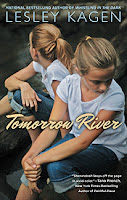 Jeannette Walls' The Glass Castle has been sitting on my shelf for at least two years, but after a friend recently urged me to JUST READ IT, I moved it up in the queue. This one's had a lot of hype and been around for quite a while, so you probably already know it.
Jeannette Walls' The Glass Castle has been sitting on my shelf for at least two years, but after a friend recently urged me to JUST READ IT, I moved it up in the queue. This one's had a lot of hype and been around for quite a while, so you probably already know it.Jeannette grew up with some...interesting...parents. They were, at the same time, incredibly inspiring and incredibly negligent. I hesitate to specify any particular anecdotes so as not to sway your judgments one way or another, because this book has a very strange grey-area sort of perspective. It's written in brief snippets of chapters that are anecdotal, which make it, yes, unputdownable; it's a fast read and engrossing. But it's one of those stories that glides by on the surface as you're reading, and then when you stop to think about it, the questions pop up.
Like, isn't it interesting how Walls writes this with almost no subjectivity? Situations that enrage me, as the reader, are simply stated, without reflection or emotion. In fact, we feel more a sentiment of affection rather than anger—a sentiment that is reinforced by the fact that these family members remain a presence in each other's lives when you think most would want to move on and never look back, victims of a soon-to-be-forgotten dysfunctional adolescence.
And perhaps most importantly, how trustworthy is the author's voice? I can only attribute Walls' objectivity to the analytical adult perspective she possesses now, when looking back on memories decades old. But all these things she suffered through, all the thoughts and emotions she must have experienced as a kid and a teen, what were they like then? How would she have recorded her life in her diary, in the moment? Of course, this is a question for all memoirs, when a story relies on memories to be told.
Paris Was Ours by Penelope Rowlands is really a collection of 30-something essays or articles by a number of people who have, at some point in their life, packed up and moved to Paris. Because, really, who doesn't have that dream? I feel I can safely say that Paris is the only other city in the world alongside New York that has that "ooooOOOOoOo" aura of "living in Paris." It just has this style, this glam, these worldly cultural connotations, that make the idea of "living in Paris" something one feels they must do at some point in their life.
You know what I felt after reading all these stories? Afraid of living in Paris. Parisians are a unique breed of person (like New Yorkers) who have a distinct way of doing things (like New Yorkers) and aren't necessarily always kind to those who aren't native to their lifestyle (like New Yorkers). The thirty-two authors who contributed to this collection are diverse in age, profession, lifestyle, writing style...The stories weren't all glamorous, nor were they all intimidating. Some were humorous anecdotes, some were trivial observations. Overall, I think it painted a bit more realistic a portrait of the City of Light, making the point that it is a city with a profound influence on its inhabitants and their identities.





